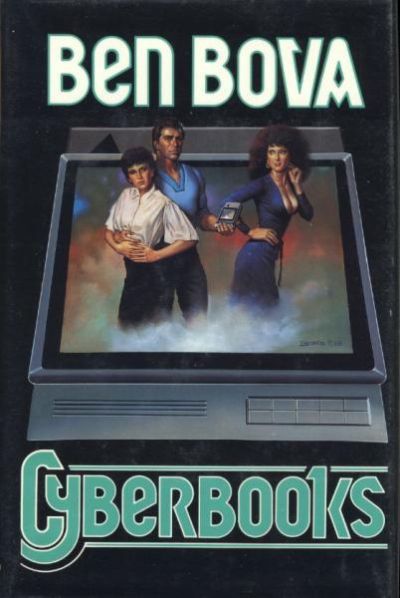The Turtles on a Log
Cyberbooks
By Ben Bova

8 Oct, 2020
Ben Bova’s 1989 Cyberbooks is a standalone near-future SF satire.
MIT computer expert Carl Lewis ventures from his native Boston, invention in hand, to seek his fortune in New York. He comes bearing an invention he hopes will revolutionize book publishing.
Naïve Carl is an optimist.
Carl offers Bunker Books the Cyberbook, a compact electronic device whose swappable optical storage wafers can store up to a thousand pages of print. While the Cyberbook will cost as much as several hardcovers, the individual books should be inexpensive, since paper books have production costs — paper, printing, distribution, storage — that the electronic books can sidestep. The Cyberbook could make books cheaper and more accessible for everyone!
There are one or two minor issues. For example, currently there is a single Cyberbook in the world, and when Carl presents it to the Bunker Books board, it does not work. Bunker Books has no experience in the consumer electronics field; turning a device from idea to commodity requires skills they do not have.
Additionally, Tarantula Enterprises CEO Weldon W. Weldon covets the Cyberbook for Tarantula subsidiary Webb Press. Weldon W. Weldon didn’t get where he is — wealthy, greedy, paranoid, and seeing Mafiosi behind every corner — by playing fair. Better to order craven subordinate Curtis Hawks to steal the Cyberbook design. To ensure that Bunker does not manage to exploit their e‑reader opportunity, alluring double agent Scarlet Dean accepts a job offer from Bunker to sabotage the company from within.
Economic realities may kill the Cyberbook in its crib. “Massive cost savings” is another way of saying “mass layoffs.” Eliminating printing, shipping, and distribution means unemployment for everyone working in printing, shipping, and distribution. Additionally, the handful of survivors will have to relearn the publishing trade, a prospect that fails to thrill. Better to launch a lawsuit to force Bunker to abandon the project.
Poor Carl is out of his depth and while he may have found true love with editor Lori Tashkajian, Lori’s professional ambitions may be as deadly to their romance as economic realities are to the Cyberbook.
~oOo~
In this book Harlem is not a crime-filled slum. In this world there was a largely successful urban renewal project that did not involve driving the current population out to allow gentrification. This is largely irrelevant to the plot but unusual enough in an SF novel that it should be mentioned.
It’s not often that SF novels remind me of Canadian transportation history. Back in the 1920, Canadian provinces began to harmonize which side of the road drivers used. Nova Scotia, faced with the problem of retraining oxen to haul wagons on the right, simply slaughtered the previous cohort of oxen and replaced them with younger beasts. Thus, Nova Scotia’s Year of Free Beef! This suggests that it would be easier said than done to teach old editors how to use new software.
I regret to inform you that this is a terrible book. Let me count the ways: shaky plotting, broad ethnic stereotypes, Male Gaze1.
Still, as long as you keep your expectations low — no, even lower than that — there are some interesting tidbits. For example, while it might seem absurd that a character might with a straight face say—
Computers can check a manuscript’s spelling and grammar much more thoroughly than any human being can. What do editors do that computers can’t?
—one could without too much trouble find a publisher who appears to believe that hands-on editing is misplaced effort. It’s an absurd belief but that publishing insider might believe it is all too credible.
The novel has a deeply cynical view of the publishing industry; few people know how to do their jobs and those who do are often prevented by standard practices from doing them. Given the author’s lengthy career, one wonders how many of the absurd moments in this book are drawn from real life2.
The 1989 book’s vision of an e‑reader isn’t unreasonable, seen in the light of 2020: it costs about two hardcovers, which is within the low end of the range seen in actual practice now that we have them. If the 1000-page memory capacity of the wafers seems low by 2020 standards, remember that they include high-resolution, full-colour illustrations. The prediction that one might buy books via phone was correct. Carl doesn’t understand just how low the incremental costs of paper publishing are — there is a reason why MMPB returns are stripped and destroyed rather than being shipped back — but he’s hardly alone in that. His faith in what is clearly DRM is perhaps excessive but not all of the characters shared it3.
It’s a shame the broad comedy falls so flat because there were some interesting bits. Ah, well.
The Tor edition I read appears to be out of print.
1: Interestingly, given the era in which this was written, when Carl’s love interest has to choose between true love or her career, she chooses her career and Carl accepts her decision. Consider, for example, the domesticity subplots of Die Hard and The Abyss.
2: There’s a subplot involving books falling apart due to bad glue. This has happened. A British game company learned the hard way, when air-shipping a brand-new book to North American markets, that their binding glue couldn’t survive the conditions in a plane’s cargo hold. Oops! But binding issues are rife in publishing, as many of my Lancer books could attest.
3: In general, Carl has more sunny optimism about how things will work out than the facts or text warrant. His belief that e‑readers will bring literacy to downtrodden masses assumes someone will be giving expensive e‑readers away to the deserving poor.
